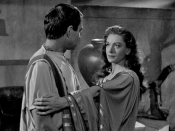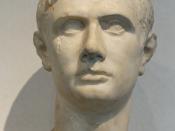Charlie Henrich
Ms. Emmett
Tragic Hero Essay
4/29/11
Marcus Brutus is the tragic hero in Julius Caesar, the famous play written by William Shakespeare. Throughout the story Brutus is faced with many situations that he has to overcome, such as deciding whether to kill Caesar or not. A tragic hero is defined as a noble character who dies due to an uncontrollable force and usually meets a tragic death. Brutus experienced all of these elements before meeting his death in Julius Caesar.
Brutus displays hamartia, or lack of judgment many times in the play. His lack of judgment is exemplified when he decides not to tell Portia about what he and the conspirators were planning to do. Brutus's men notify him that Portia has died from swallowing hot coals and he says "No man bears sorrow. Portia is dead" (4.3.145). This is an example of hamartia for Brutus because by not choosing to include Portia in the plot to kill Caesar, she becomes distraught and ends up killing herself.
If Brutus would have informed Portia of the conspiracy her tragic death might have never happened.
At the end of the play Brutus dies due to uncontrollable forces. Brutus dies at the battle of Phillipi and this battle was monumental because the future of Rome was at stake. Brutus meets his death by running into his own sword and killing himself. He does this because he could not control the army and they were losing the battle. Before Brutus dies he says "Farewell. Good Strato-Caesar, now be still; I killed not thee with half so good a will" (5.5.50-51). This quote shows that Brutus is responsible for his own death and accepts death with honor so this makes him a tragic hero.
When Brutus joins in the plot to...


